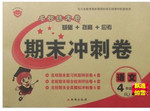
__________ were sent to hospital and ___________ were buried.
[ ]
 名校练考卷期末冲刺卷系列答案
名校练考卷期末冲刺卷系列答案科目:高中英语 来源: 题型:
完成句子(共10小题;每小题1.5分,满分15分)
阅读下列各小题,根据括号内的汉语提示,用句末括号内的英语单词完成句子,并将答案写在答题卡上的相应题号后。
1.Do remember to remind her (关掉) the gas before she leaves. (turn)
2.Lots of policemen were sent to prevent them (砍) the trees. (cut)
3. (为何他们突然消失) then still remains a mystery. (disappear)
4.Giving children whatever they want (对他们有害). (harmful)
5.I feel so sick. I wish Mum (没有逼我) to eat so much. (force)
6.These chemical changes produced a chain reaction, which (使可能) for life to develop. (make)
7. (如果时间允许), I hope to visit the museum. (permit)
8.The house (他付了) a large sum of money three years ago is now worth twice as much. (pay)
9.With such a lot of work on hand, he (不应该去) to the cinema last night. (should)
10. (他设法) carry out the experiment last year has encouraged his workmates greatly. (manage)
查看答案和解析>>
科目:高中英语 来源: 题型:阅读理解
While parents, particularly mothers, have always been attached to their infants (婴儿), societal conditions frequently made this attachment difficult to maintain (保持). First of all, the high infant death rate in the premodern times meant that such attachments often ended in hopelessness. Perhaps to prevent the sadness that infant death caused, a number of societal practices developed which worked against early attachment of mother and child.
One of these premodern attachment-discouraging practices was to leave infants unnamed until they had survived into the second year. Another practice that discouraged maternal (母亲的) attachment was tightly wrapping (包裹) infants. Wrapping effectively prevented the close physical interactions like stroking (抚摸) and kissing that are so much a part of modern mothers' and fathers' affection for their infants.
A third practice which had the same distancing effect was wet-nursing. Breast-feeding (母乳哺育) was not popular among the well-to-do in the early modern times; infants were often fed by wet nurses hired for the purpose. In some places, such as nineteenth-century France, city infants were sent to wet nurses in the country. Often a wet nurse would feed her own child first, leaving little milk for the city infant—who, in many cases, died. In Rouen, the death rate for children sent to a wet nurse was 35 percent.
68. Babies were unnamed until they were two so that _______.
A. an old social custom could be kept up B. maternal attachment could be maintained
C. they could have better chances to survive D. their parents would not be too sad if they died
69. Why were babies wrapped?
A. To protect them from the cold. B. To distance their mothers from them.
C. To make them feel more comfortable. D. To make it easy for their mothers to hold them.
70. Wet nurses were women who________.
A. babysat city infants B. fed babies of other families
C. sent their babies to the country D. failed to look after their babies
71. Which is the best title for the passage?
A. Societal Conditions in Premodern Times
B. Practices of Reducing Maternal Attachment
C. Poor Health Service and High Infant Death Rate
D. Differences between Modem and Premodern Parents
查看答案和解析>>
科目:高中英语 来源:2013届安徽省高三省级示范高中名校联考英语试卷(带解析) 题型:单选题
When we got there after the accident,we were told that the injured to the nearest hospital.
| A.were sent | B.had been sent |
| C.have been sent | D.are sending |
查看答案和解析>>
科目:高中英语 来源:2014届安徽安庆望江四中高三第一学期第一次月考英语卷(解析版) 题型:单项填空
After the heavy mudslide happened in Sichuan, hundreds of newspaper reporters were sent to ____ the natural disaster.
A. describe B. cover C. witness D. experience
查看答案和解析>>
科目:高中英语 来源: 题型:阅读理解
查看答案和解析>>
湖北省互联网违法和不良信息举报平台 | 网上有害信息举报专区 | 电信诈骗举报专区 | 涉历史虚无主义有害信息举报专区 | 涉企侵权举报专区
违法和不良信息举报电话:027-86699610 举报邮箱:58377363@163.com